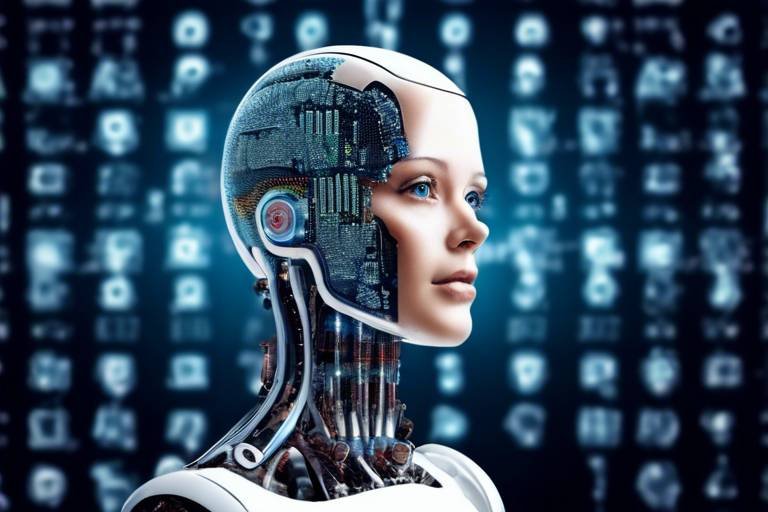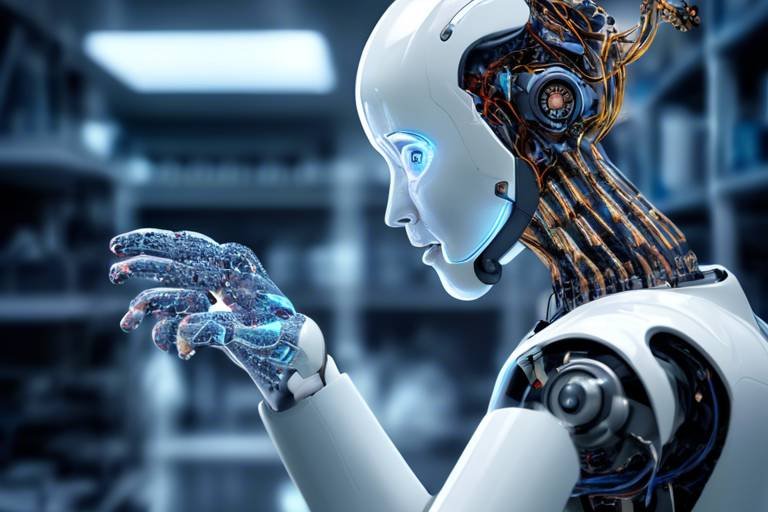Emerging Trends in Artificial Intelligence
Artificial intelligence (AI) has swiftly transformed from a futuristic concept into a tangible reality that shapes our daily lives. With advancements happening at an unprecedented pace, it's crucial to stay informed about the emerging trends that are redefining industries and society as a whole. From healthcare to finance, AI is not just a tool; it's becoming a fundamental part of how we operate, innovate, and interact. Imagine a world where machines can not only think but also learn and adapt—this is the essence of AI's evolution.
One of the most exciting aspects of AI is its ability to analyze vast amounts of data in real-time. This capability allows businesses and organizations to make informed decisions faster than ever before. For instance, in the healthcare sector, AI algorithms can sift through thousands of medical records to identify patterns that a human might overlook. This not only enhances diagnostics but also leads to personalized treatment plans tailored to individual patients. The implications are profound, as they can significantly improve patient outcomes and streamline administrative processes.
As we delve deeper into the world of AI, we find that the technology is also making headway in natural language processing (NLP). This branch of AI enables machines to understand and generate human language, opening up new avenues for communication. Whether it’s through chatbots that provide instant customer service or sophisticated translation services that bridge language barriers, NLP is changing the way we interact with technology. The ability to analyze sentiment and context in conversations gives businesses a powerful tool to gauge customer satisfaction and improve their offerings.
However, with great power comes great responsibility. As AI continues to evolve, ethical considerations and governance frameworks are becoming increasingly vital. Questions of bias, privacy, and accountability in AI systems are at the forefront of discussions among technologists and policymakers alike. It’s essential to ensure that AI is used responsibly, and that it benefits everyone without perpetuating existing inequalities. The development of robust ethical guidelines is crucial to navigating this complex landscape.
The automotive industry is another area experiencing a significant transformation due to AI. The integration of AI in autonomous vehicles is not just about creating self-driving cars; it’s about enhancing safety and efficiency on our roads. Imagine a future where traffic accidents are drastically reduced because vehicles can communicate with one another and make split-second decisions. This shift could pave the way for smart cities, where transportation systems are interconnected and optimized for maximum efficiency.
Cybersecurity is yet another field where AI is making a monumental impact. With the rise of cyber threats, AI is stepping in to bolster defenses. By employing machine learning algorithms, organizations can detect threats in real-time, automate responses, and even predict potential attacks. This proactive approach is essential in an era where cybercrime is becoming increasingly sophisticated, and traditional methods of defense are no longer sufficient.
In finance, AI is streamlining operations through applications like algorithmic trading and fraud detection. The ability to analyze market trends and execute trades at lightning speed has revolutionized how investments are managed. Moreover, AI helps in risk management by predicting market fluctuations, allowing financial institutions to make quicker, more informed decisions. This not only enhances operational efficiency but also improves customer experiences by offering tailored financial products.
Sustainability is another critical area where AI is making strides. From optimizing resource use to predicting climate patterns, AI technologies are being harnessed to tackle environmental challenges. For instance, AI can analyze data from satellite imagery to monitor deforestation or track wildlife populations, aiding in conservation efforts. By leveraging AI, we can promote a sustainable future and ensure that we are better stewards of our planet.
In the realm of education, AI is reshaping how learning is delivered. Personalized learning experiences powered by AI can cater to individual student needs, making education more accessible and engaging. Automated administrative tasks free up educators to focus on teaching, while real-time feedback mechanisms enhance learning outcomes. The potential for AI to transform education is immense, creating a more inclusive and effective learning environment.
Looking ahead, the future of AI promises continued innovation and integration across various sectors. As we adapt to these transformative technologies, new opportunities and challenges will arise. The key will be to harness the power of AI responsibly, ensuring that it serves as a force for good in society. The possibilities are endless, and the journey is just beginning.
- What is artificial intelligence? AI refers to the simulation of human intelligence in machines programmed to think and learn.
- How is AI used in healthcare? AI enhances diagnostics, personalizes medicine, and improves operational efficiency in healthcare settings.
- What are the ethical concerns surrounding AI? Key concerns include bias, privacy, and accountability in AI systems.
- How does AI improve cybersecurity? AI detects threats, automates responses, and predicts potential cyber attacks.
- What is the future of AI? The future holds continued innovation across various sectors, with a focus on responsible use and ethical considerations.

AI in Healthcare
Artificial intelligence is not just a buzzword; it's a game changer in the world of healthcare. Imagine walking into a clinic where the doctor already knows your medical history, potential health risks, and the best treatment options tailored just for you. Sounds like something out of a sci-fi movie, right? But this is becoming a reality, thanks to the rapid advancements in AI technology. From improved diagnostics to personalized medicine, AI is revolutionizing the way we approach health and wellness.
One of the most exciting areas where AI is making waves is in **diagnostics**. Traditional methods can be time-consuming and prone to human error, but AI algorithms can analyze medical images with remarkable accuracy. For instance, deep learning models can detect early signs of diseases like cancer in radiology images, often outperforming human specialists. This not only speeds up the diagnostic process but also increases the chances of successful treatment.
Moreover, AI is paving the way for **personalized medicine**. No two patients are the same, and AI helps in crafting treatment plans that consider individual genetic makeups, lifestyles, and preferences. By analyzing vast amounts of data, AI can identify which treatments are likely to be the most effective for specific patients. This shift from a one-size-fits-all approach to personalized care is a significant leap forward in improving patient outcomes.
But it doesn't stop there. AI is also streamlining **operational efficiency** in healthcare facilities. Think about the countless hours spent on administrative tasks, from scheduling appointments to managing patient records. AI-driven systems can automate these processes, allowing healthcare professionals to focus on what they do best—caring for patients. This not only reduces overhead costs but also enhances the overall patient experience.
In addition to improving processes, AI is also enhancing patient engagement. With the rise of telemedicine, AI-powered chatbots are becoming the first point of contact for many patients. These chatbots can answer common questions, triage symptoms, and even provide reminders for medication, making healthcare more accessible than ever.
Here’s a quick overview of how AI is transforming various aspects of healthcare:
| AI Application | Description | Benefits |
|---|---|---|
| Diagnostics | AI analyzes medical images for disease detection | Faster and more accurate diagnoses |
| Personalized Medicine | Customizes treatment plans based on individual data | Improved treatment effectiveness |
| Operational Efficiency | Automates administrative tasks | Reduces costs and enhances patient care |
| Patient Engagement | Utilizes chatbots for support and information | Increased accessibility and convenience |
As we venture further into this AI-driven era, the implications for healthcare are profound. We are not only witnessing enhanced patient outcomes but also a transformation in how healthcare is delivered. It’s like having a personal health assistant that’s always available and constantly learning. However, with great power comes great responsibility. As we embrace these technologies, it’s crucial to ensure that ethical considerations, such as data privacy and algorithmic bias, are addressed to maintain trust in the healthcare system.
In conclusion, AI is not just reshaping healthcare; it’s redefining it. The potential is limitless, and as we continue to innovate, the healthcare landscape will evolve in ways we can only begin to imagine. So, the next time you visit a healthcare facility, remember that behind the scenes, AI is working tirelessly to ensure you receive the best care possible.

Natural Language Processing
Natural Language Processing (NLP) is one of the most exciting and rapidly evolving fields in artificial intelligence. Imagine being able to have a conversation with your computer, and it understands you as well as a human would! That's the magic of NLP. This technology enables machines to not only understand human language but also to generate it, making interactions smoother and more intuitive than ever before. From chatbots that can answer your questions to sophisticated translation services that break down language barriers, the applications of NLP are vast and varied.
One of the most significant advancements in NLP is the development of contextual understanding. Earlier models struggled with nuances and context, often leading to misunderstandings. However, with the advent of deep learning and neural networks, machines are now better equipped to grasp the subtleties of human language. For instance, consider the difference between the phrases "bank on the river" and "bank for your money." A well-trained NLP model can discern the context and provide relevant responses based on that understanding.
NLP is not just about understanding language; it's also about generating it. This capability has given rise to various applications, including:
- Chatbots: These virtual assistants can engage in conversations, answer queries, and provide customer support, making them invaluable to businesses.
- Sentiment Analysis: Companies can analyze customer feedback and social media interactions to gauge public opinion about their products or services.
- Translation Services: Tools like Google Translate have improved dramatically, allowing for real-time translation that helps bridge communication gaps across cultures.
However, as with any powerful technology, NLP comes with its challenges. One major concern is bias. If the data used to train NLP models contains biased information, the outputs will reflect those biases, leading to unfair or inaccurate results. To combat this, researchers are working diligently to create more inclusive datasets and develop algorithms that can identify and mitigate bias.
Furthermore, privacy is a critical issue in the realm of NLP. As these systems process vast amounts of personal data, ensuring that user information is protected is paramount. Companies must prioritize ethical practices and transparency to build trust with their users.
In summary, Natural Language Processing is transforming the way we interact with technology. As we continue to refine these systems, the potential for NLP is boundless. Whether it's enhancing customer service through intelligent chatbots or providing seamless translation services, the future of NLP is bright. It's not just about machines understanding us; it's about creating a more connected and communicative world.
- What is Natural Language Processing?
NLP is a field of artificial intelligence that focuses on the interaction between computers and humans through natural language. - How is NLP used in everyday applications?
NLP powers chatbots, translation services, sentiment analysis tools, and more, making technology more accessible and user-friendly. - What are the challenges faced by NLP?
Challenges include dealing with bias in data, ensuring privacy, and improving contextual understanding. - What is the future of NLP?
The future promises more advanced applications, better understanding of context, and increased integration into various industries.

AI Ethics and Governance
As we plunge deeper into the world of artificial intelligence, the conversation around ethics and governance has never been more critical. The rapid advancements in AI technology are like a double-edged sword; while they offer remarkable benefits, they also present significant challenges that we must navigate carefully. Imagine AI as a powerful engine driving us toward a future filled with possibilities, but without proper steering, it could veer off course, leading to unintended consequences.
One of the most pressing issues is the potential for bias in AI systems. Algorithms are only as good as the data fed into them, and if that data reflects historical prejudices or inequalities, the AI can perpetuate these biases. This raises questions about fairness and equality, especially in sectors like hiring, law enforcement, and lending. For instance, if an AI system is trained on biased data, it may unfairly disadvantage certain groups, leading to a cycle of discrimination. Therefore, it's imperative that we establish robust frameworks to ensure that AI systems are developed and deployed in a manner that promotes equity.
Privacy is another critical concern. With AI's ability to analyze vast amounts of personal data, we must ask ourselves: how much of our privacy are we willing to sacrifice for convenience? The implementation of AI in areas like surveillance and data analysis can lead to intrusive monitoring, which can infringe on individual rights. Striking a balance between harnessing AI's capabilities and protecting personal privacy is essential. Legislation such as the General Data Protection Regulation (GDPR) in Europe serves as a model for how we might govern AI technologies while safeguarding personal data.
Accountability is also a vital component of AI governance. When an AI system makes a mistake—say, in a medical diagnosis or a financial transaction—who is held responsible? Is it the developers, the users, or the AI itself? Establishing clear lines of accountability is crucial to foster trust in AI systems. We need to create a culture where developers are responsible for the ethical implications of their creations, ensuring that they are not just technologically advanced but also socially responsible.
To address these challenges, many organizations and governments are beginning to formulate ethical guidelines and governance frameworks. These guidelines often include principles such as:
- Transparency: AI systems should be understandable and explainable to users.
- Fairness: AI should be designed to promote positive outcomes for all individuals, regardless of background.
- Accountability: Clear responsibilities must be defined for AI developers and users.
- Privacy Protection: Safeguards should be in place to protect personal data.
In conclusion, the ethical landscape of AI is complex and ever-evolving. As we continue to innovate, we must remain vigilant about the implications of our technologies. The road ahead will require collaboration between technologists, ethicists, policymakers, and the public to ensure that AI serves humanity positively. By prioritizing ethics and governance in AI development, we can harness its power while minimizing risks and fostering a future where technology and humanity thrive together.
Q1: What is AI ethics?
AI ethics refers to the moral principles and guidelines that govern the development and deployment of artificial intelligence technologies, ensuring they are used responsibly and fairly.
Q2: Why is governance important in AI?
Governance is crucial in AI to establish rules and frameworks that ensure accountability, transparency, and fairness, helping to mitigate risks associated with AI technologies.
Q3: How can bias in AI be addressed?
Bias in AI can be addressed by using diverse and representative datasets, implementing regular audits, and involving diverse teams in the development process.
Q4: What role do governments play in AI ethics?
Governments play a vital role in creating regulations and policies that promote ethical AI development, ensuring that technologies align with societal values and protect individual rights.

AI in Autonomous Vehicles
Imagine a world where your car drives itself, effortlessly navigating through traffic while you sit back and relax. This is no longer the stuff of science fiction; it's becoming a reality thanks to artificial intelligence (AI). The integration of AI in autonomous vehicles is not just a technological marvel; it's a game changer for the entire transportation industry. With AI at the helm, these vehicles are designed to enhance safety, improve efficiency, and pave the way for smarter urban environments.
One of the most significant benefits of AI in autonomous vehicles is the potential for increased safety. Traditional driving is fraught with risks—distractions, fatigue, and human error account for a staggering percentage of road accidents. However, AI systems are capable of processing vast amounts of data in real-time, allowing them to make split-second decisions that can prevent accidents. For instance, AI can analyze data from sensors, cameras, and radar to detect obstacles, pedestrians, and other vehicles, enabling the car to react faster than a human driver ever could.
Moreover, AI enhances operational efficiency. Autonomous vehicles can optimize routes based on traffic conditions, weather, and other variables, leading to reduced travel times and lower fuel consumption. This not only benefits individual drivers but also contributes to less congestion on our roads. Imagine a city where traffic flows smoothly, emissions are minimized, and public transport is seamlessly integrated with personal vehicles. This vision is becoming increasingly achievable through the deployment of AI technologies.
In addition to safety and efficiency, AI in autonomous vehicles is paving the way for the development of smart cities. As these vehicles become more prevalent, they can communicate with each other and with the infrastructure around them. This interconnectedness allows for better traffic management, improved public safety, and enhanced urban planning. For example, traffic lights can adjust in real-time based on the flow of autonomous vehicles, reducing wait times and improving overall traffic flow.
However, the journey toward fully autonomous vehicles is not without its challenges. There are significant hurdles to overcome, including legal regulations, ethical considerations, and public acceptance. The question of liability in the event of an accident involving an autonomous vehicle remains a hot topic of debate. Who is responsible—the manufacturer, the software developer, or the owner of the vehicle? These are complex issues that require careful consideration as we move forward.
As we look to the future, the landscape of transportation is set to change dramatically. With advancements in AI, we are not just witnessing the rise of autonomous vehicles; we are also entering an era where transportation is more sustainable, efficient, and accessible. The implications of this technology extend beyond personal convenience; they touch on environmental sustainability, economic growth, and societal transformation.
In summary, AI in autonomous vehicles is revolutionizing the way we think about transportation. With its potential to enhance safety, improve efficiency, and contribute to the development of smart cities, the future looks promising. As we continue to embrace these technologies, we must also navigate the challenges they present, ensuring that we harness their power responsibly and ethically.
- What is an autonomous vehicle?
An autonomous vehicle is a car or truck that is capable of traveling without human input, using a combination of sensors, cameras, and AI algorithms to navigate. - How does AI improve safety in autonomous vehicles?
AI processes data from various sensors to detect obstacles and make real-time decisions, significantly reducing the chances of accidents caused by human error. - What are the challenges facing autonomous vehicles?
Challenges include regulatory hurdles, ethical concerns regarding liability, and the need for public acceptance and trust in the technology. - Will autonomous vehicles reduce traffic congestion?
Yes, by optimizing routes and enabling better traffic management, autonomous vehicles have the potential to reduce congestion and improve overall traffic flow.

AI and Cybersecurity
In today's digital landscape, where cyber threats loom large and data breaches make headlines, artificial intelligence (AI) has emerged as a formidable ally in the fight against cybercrime. Imagine AI as a vigilant guard dog, tirelessly patrolling the perimeter of your digital assets, ready to bark at the first sign of trouble. This technology is not just a buzzword; it's actively reshaping how organizations protect their sensitive information and systems.
One of the most significant advantages of AI in cybersecurity is its ability to analyze vast amounts of data at lightning speed. Traditional security measures often struggle to keep up with the sheer volume of data generated daily. However, AI algorithms can sift through this data, identifying patterns and anomalies that may indicate a potential threat. It's like having a super-sleuth on your team, capable of spotting the tiniest details that human eyes might miss.
Moreover, AI-driven systems can automate responses to detected threats, drastically reducing the time it takes to mitigate risks. This is crucial because, in the realm of cybersecurity, every second counts. For instance, when a suspicious activity is detected, AI can automatically isolate affected systems, alert security personnel, and even initiate countermeasures without waiting for human intervention. This level of responsiveness is akin to having a fire alarm that not only sounds an alert but also calls the fire department simultaneously!
As we delve deeper into the role of AI in cybersecurity, it's essential to recognize its multifaceted applications:
- Threat Detection: AI systems can continuously monitor network traffic and user behavior, flagging unusual activities that could signify a breach.
- Fraud Prevention: In finance, AI algorithms analyze transaction patterns to detect and prevent fraudulent activities.
- Predictive Analytics: By leveraging historical data, AI can predict potential vulnerabilities and recommend preemptive measures.
However, while AI offers powerful tools for enhancing cybersecurity, it also presents new challenges. Cybercriminals are increasingly using AI to develop sophisticated attacks, making it a double-edged sword. For example, AI can be employed to create deepfakes or automate phishing attacks, which can be incredibly convincing and harder to detect. This arms race between defenders and attackers underscores the need for continuous innovation and vigilance.
To combat these evolving threats, organizations must adopt a comprehensive approach that combines AI with human expertise. While AI can handle the heavy lifting of data analysis and threat detection, human intuition and decision-making are irreplaceable. The best defense is a collaborative effort where AI assists cybersecurity professionals, enhancing their capabilities rather than replacing them.
In conclusion, the integration of AI into cybersecurity is not just a trend; it's a necessity in our increasingly digital world. As organizations continue to embrace this technology, they can enhance their security posture, respond to threats more effectively, and ultimately protect their valuable assets. As we look to the future, the synergy between AI and cybersecurity will be crucial in navigating the complexities of the digital landscape.
- What are the main benefits of AI in cybersecurity? AI enhances threat detection, automates responses, and analyzes large datasets to identify potential vulnerabilities.
- Can AI be used by cybercriminals? Yes, cybercriminals can utilize AI to execute sophisticated attacks, making it essential for defenders to stay ahead.
- Is AI replacing human jobs in cybersecurity? While AI automates certain tasks, it complements human expertise, making cybersecurity teams more effective.
- How can organizations implement AI in their cybersecurity strategy? Organizations should integrate AI tools with existing security measures and ensure continuous training for their teams.

AI in Finance
Artificial Intelligence is making significant waves in the finance sector, and the impact is nothing short of revolutionary. Imagine a world where financial decisions are made with the precision of a laser beam, where algorithms analyze vast amounts of data in seconds, and where fraud detection is almost instantaneous. Yes, this is the new reality brought forth by AI. Financial institutions are leveraging AI not just to enhance their operational efficiency, but also to provide a more personalized experience for their clients. Isn't it fascinating how technology is transforming the way we manage our money?
One of the primary ways AI is reshaping finance is through algorithmic trading. This process involves the use of complex algorithms to execute trades at optimal prices, taking into account market conditions and historical data. Traders are no longer solely relying on gut feelings; instead, they are using AI-driven insights to make informed decisions. This not only increases the speed of transactions but also significantly reduces the chances of human error. The result? A more efficient market where trades are executed at lightning speed.
Moreover, AI is playing a crucial role in fraud detection. With the rise of digital transactions, the risk of fraud has escalated. AI systems are now capable of analyzing transaction patterns and flagging any anomalies that might indicate fraudulent activity. These systems learn from each interaction, continuously improving their ability to detect and prevent fraud. For instance, if a user suddenly makes a large withdrawal from an unusual location, the AI can recognize this as a potential red flag and alert the bank to investigate further. This proactive approach not only protects consumers but also saves financial institutions millions of dollars.
In addition to trading and fraud detection, AI is enhancing risk management processes. Financial institutions face numerous risks, from credit risks to market fluctuations. AI tools can analyze historical data and current market conditions to provide insights into potential risks, allowing companies to make more informed decisions. This predictive capability is invaluable, as it helps organizations prepare for various scenarios, ensuring they remain resilient in the face of uncertainty.
To illustrate the impact of AI in finance, consider the following table that highlights the key applications:
| Application | Description |
|---|---|
| Algorithmic Trading | Using algorithms to execute trades based on market data and trends. |
| Fraud Detection | Analyzing transaction patterns to identify and prevent fraudulent activities. |
| Risk Management | Assessing potential risks using historical and real-time data analysis. |
| Customer Service | Implementing chatbots and virtual assistants to enhance customer interactions. |
Furthermore, AI is enhancing customer service in finance. Chatbots and virtual assistants powered by AI are becoming the front line of customer interaction. They can answer queries, provide account information, and even assist in financial planning, all while learning from each interaction to improve their responses. This not only frees up human agents to handle more complex issues but also ensures that customers receive immediate assistance, enhancing their overall experience.
As we look to the future, the integration of AI in finance is expected to deepen. Financial institutions will continue to harness AI to drive innovation, improve efficiency, and enhance customer experiences. However, with this rapid advancement comes the responsibility to ensure that these technologies are used ethically and transparently. Are we ready to embrace this new era of finance?
- How is AI used in financial trading?
AI algorithms analyze market data to execute trades at optimal prices, enhancing speed and accuracy. - What role does AI play in fraud detection?
AI systems monitor transaction patterns to identify and prevent fraudulent activities in real-time. - Can AI improve customer service in finance?
Yes, AI-powered chatbots provide immediate responses to customer inquiries, improving overall service efficiency. - What are the risks associated with AI in finance?
While AI enhances efficiency, it also raises concerns about data privacy, algorithmic bias, and the need for ethical governance.

AI for Environmental Sustainability
Artificial Intelligence (AI) is emerging as a powerful ally in the fight for environmental sustainability. With the world facing pressing challenges such as climate change, resource depletion, and biodiversity loss, AI technologies are stepping in to provide innovative solutions that can make a real difference. Imagine a world where machines not only assist in our daily tasks but also help us protect our planet. This is not just a dream; it's rapidly becoming our reality!
One of the most exciting applications of AI in environmental sustainability is its ability to optimize resource use. For instance, AI algorithms can analyze data from various sources to predict water usage patterns in agriculture. By accurately forecasting when and how much water is needed, farmers can significantly reduce waste, leading to more sustainable farming practices. This not only conserves precious water resources but also enhances crop yields, creating a win-win situation for both farmers and the environment.
Moreover, AI is playing a pivotal role in predicting climate patterns. By processing vast amounts of data from satellites, sensors, and historical records, AI systems can identify trends and anomalies in climate behavior. This information is invaluable for governments and organizations as they develop strategies to combat climate change. For example, AI can help in forecasting extreme weather events, allowing communities to prepare and respond more effectively. It's like having a crystal ball that provides insights into the future of our planet!
In addition to resource management and climate prediction, AI is also being used in conservation efforts. Machine learning algorithms are being employed to monitor wildlife populations and habitats. By analyzing images from camera traps and drones, AI can help conservationists track endangered species and assess the health of ecosystems. This technology can identify potential threats to wildlife, such as poaching or habitat destruction, enabling timely intervention. The ability to safeguard biodiversity is crucial for maintaining ecological balance.
Furthermore, AI is enhancing renewable energy efforts. Smart grids powered by AI can optimize energy distribution, ensuring that renewable sources like solar and wind are utilized efficiently. For instance, AI can predict energy demand and adjust supply accordingly, minimizing reliance on fossil fuels. This not only reduces carbon emissions but also supports the transition to a more sustainable energy future. Imagine a world where our energy consumption is perfectly balanced with what the planet can provide!
As we delve deeper into the potential of AI for environmental sustainability, it's essential to recognize the importance of ethical considerations. While AI offers remarkable benefits, it also poses challenges, such as data privacy and the risk of exacerbating inequalities. Therefore, developing robust governance frameworks is crucial to ensure that AI technologies are used responsibly and equitably. This is where collaboration between governments, businesses, and communities becomes vital. By working together, we can harness the power of AI to create a sustainable future.
In summary, AI is not just a tool; it's a transformative force that can help us tackle some of the most pressing environmental challenges we face today. From optimizing resource use to enhancing conservation efforts, the potential applications are vast and varied. As we continue to innovate and integrate AI into our sustainability strategies, we must remain vigilant about the ethical implications and strive for inclusive solutions. The future of our planet may very well depend on how we leverage this incredible technology!
- How is AI helping in climate change mitigation?
AI helps in predicting climate patterns, optimizing resource use, and enhancing renewable energy efforts, thereby contributing to climate change mitigation. - What role does AI play in wildlife conservation?
AI is used to monitor wildlife populations and habitats through image analysis from camera traps and drones, helping conservationists protect endangered species. - Are there any ethical concerns with using AI for environmental sustainability?
Yes, ethical concerns include data privacy, potential biases in AI algorithms, and ensuring equitable access to AI technologies. - Can AI improve resource management in agriculture?
Absolutely! AI can analyze data to predict water usage patterns, helping farmers reduce waste and improve crop yields sustainably.

AI in Education
Artificial Intelligence is not just a buzzword in the tech world; it's a transformative force in education that is reshaping how students learn and teachers instruct. Imagine a classroom where each student receives a customized learning experience tailored to their unique needs. AI makes this vision a reality. By leveraging advanced algorithms and data analytics, educational institutions are now able to analyze individual student performance and adapt learning materials accordingly. This means that no student is left behind, as AI can identify areas where they struggle and provide additional resources or alternative methods to help them grasp complex concepts.
One of the most exciting developments in AI for education is the rise of intelligent tutoring systems. These systems act like personal tutors, offering real-time feedback and guidance to students. For example, platforms powered by AI can analyze a student's response to a math problem and determine whether they are struggling with a particular concept. Based on this analysis, the system can suggest targeted exercises or even adjust the difficulty of the questions to better match the student's skill level. This kind of personalized learning experience is akin to having a dedicated tutor available 24/7, which can significantly enhance a student's understanding and retention of material.
Moreover, AI is streamlining administrative tasks for educators, allowing them to focus more on teaching and less on paperwork. Tasks such as grading assignments, managing schedules, and tracking student progress can be automated through AI systems. This efficiency not only saves time but also reduces the likelihood of human error in administrative processes. As a result, teachers can dedicate more time to engaging with their students and fostering a positive learning environment.
The integration of AI in education also extends to enhancing accessibility for students with disabilities. AI tools can provide support through speech recognition, text-to-speech technologies, and personalized learning plans that accommodate various learning styles. This inclusivity ensures that all students have the opportunity to succeed, regardless of their challenges.
However, the implementation of AI in education is not without its challenges. Concerns regarding data privacy and the ethical use of AI are paramount. Educational institutions must navigate these issues carefully to protect student information while reaping the benefits of AI technology. Establishing clear guidelines and frameworks for AI use in education will be crucial in fostering trust among students, parents, and educators alike.
As we move forward, the potential for AI in education appears limitless. It promises to revolutionize traditional teaching methods, making learning more engaging, efficient, and personalized. While we are just scratching the surface of what AI can achieve in the educational landscape, it is clear that the future holds exciting possibilities for students and educators alike.
- How does AI personalize learning experiences?
AI analyzes individual student data to tailor educational content, ensuring that each student receives support that fits their unique learning style and pace.
- Can AI replace teachers?
No, AI is designed to assist teachers, not replace them. It automates administrative tasks and provides personalized support, allowing educators to focus more on teaching.
- What are the ethical concerns surrounding AI in education?
Key concerns include data privacy, algorithmic bias, and the need for transparency in how AI systems operate and make decisions regarding student learning.
- How can AI help students with disabilities?
AI tools can provide tailored support through adaptive learning technologies, ensuring that students with disabilities receive the resources they need to succeed.

The Future of AI
The future of artificial intelligence is not just a realm of possibilities; it's a landscape of imminent transformation that will reshape our world in ways we can barely imagine. As we stand on the brink of this technological revolution, it's essential to grasp the implications of AI's continued evolution. With advancements happening at breakneck speed, AI is poised to integrate into nearly every aspect of our lives, from how we work to how we interact with technology and each other.
Imagine a world where your morning coffee is brewed by a machine that knows exactly how you like it, based on your previous preferences and even your mood. This is not science fiction; it's a glimpse into the future where AI personal assistants become an integral part of our daily routines. They will not only understand commands but will also anticipate our needs, making our lives more convenient and tailored to our individual preferences.
Moreover, the integration of AI in industries such as healthcare, finance, and education will revolutionize the way we approach problems. In healthcare, for instance, AI will not only assist in diagnostics but will also enable predictive analytics that can foresee potential health issues before they arise. This proactive approach could save countless lives and reduce healthcare costs significantly.
| Industry | Future AI Applications |
|---|---|
| Healthcare | Predictive analytics, personalized treatment plans, robotic surgeries |
| Finance | Real-time fraud detection, automated trading, risk assessment |
| Education | Adaptive learning platforms, intelligent tutoring systems, automated grading |
| Transportation | Smart traffic management, autonomous public transport, enhanced logistics |
But it's not just about efficiency and convenience; the future of AI also brings with it a host of ethical considerations. As we develop more advanced AI systems, we must grapple with questions of accountability, bias, and privacy. Who is responsible when an AI makes a mistake? How do we ensure that AI systems are fair and unbiased? These are not just technical challenges; they are societal ones that will require collaboration between technologists, ethicists, and policymakers.
Furthermore, as AI continues to evolve, we can expect to see a rise in collaborative AI, where humans and machines work together in harmony. This synergy could lead to breakthroughs in creative fields, where AI acts as a co-creator alongside human artists, musicians, and writers, pushing the boundaries of innovation and creativity.
As we peer into the future, it's clear that the trajectory of AI is intertwined with our own. The advancements we embrace today will shape the world for generations to come. It's an exciting time to be part of this journey, but it also carries a responsibility to ensure that we harness this powerful technology for the greater good. As we adapt to these changes, we must remain vigilant and proactive in addressing the challenges that accompany such profound technological shifts.
- What is the most significant impact of AI on society? AI has the potential to enhance efficiency and personalization across various sectors, improving quality of life and productivity.
- How will AI affect job markets? While AI may automate certain tasks, it will also create new job opportunities in tech and other sectors, requiring a shift in skills.
- What are the ethical concerns surrounding AI? Key concerns include bias in AI algorithms, data privacy, and the accountability of AI decisions.
- How can we prepare for an AI-driven future? Emphasizing education in technology and ethics, along with fostering adaptability, will be crucial for navigating the changes ahead.
Frequently Asked Questions
- What are the key benefits of AI in healthcare?
AI is transforming healthcare by improving diagnostics, personalizing treatment plans, and increasing operational efficiency. This means better patient outcomes and streamlined administrative processes, allowing healthcare professionals to focus more on patient care than paperwork.
- How is natural language processing changing communication?
Natural language processing (NLP) enables machines to understand and generate human language, making it possible for chatbots to assist customers, translation services to break down language barriers, and sentiment analysis tools to gauge public opinion. It's like giving computers a voice and understanding, opening new avenues for interaction!
- What ethical concerns surround AI technology?
As AI evolves, ethical concerns such as bias, privacy, and accountability are becoming increasingly important. It's essential to establish governance frameworks that ensure AI is used responsibly, minimizing negative impacts on society and individuals.
- How does AI enhance the safety of autonomous vehicles?
AI enhances the safety of autonomous vehicles by processing vast amounts of data from sensors and cameras in real-time, allowing for quick decision-making that can prevent accidents. This technology is paving the way for smarter cities and innovative transportation solutions.
- In what ways is AI improving cybersecurity?
AI is a game-changer in cybersecurity, as it can detect threats faster than traditional methods, automate responses to incidents, and even predict potential attacks. This proactive approach strengthens defenses against cybercrime and protects sensitive data.
- How is AI utilized in the finance sector?
In finance, AI streamlines operations through algorithmic trading, enhances fraud detection, and improves risk management. This results in quicker decision-making processes and a better customer experience, making financial services more efficient and reliable.
- Can AI contribute to environmental sustainability?
Absolutely! AI is being leveraged to tackle environmental challenges by optimizing resource use, predicting climate patterns, and supporting conservation efforts. It's like having a smart assistant that helps us protect our planet for future generations.
- What role does AI play in education?
AI is reshaping education by personalizing learning experiences for students, automating administrative tasks for educators, and providing real-time feedback. This leads to improved teaching and learning outcomes, making education more accessible and effective.
- What does the future hold for artificial intelligence?
The future of AI looks bright, with continued innovation and integration across various sectors. As society adapts to these transformative technologies, we can expect new opportunities and challenges that will shape our world in exciting ways.



















